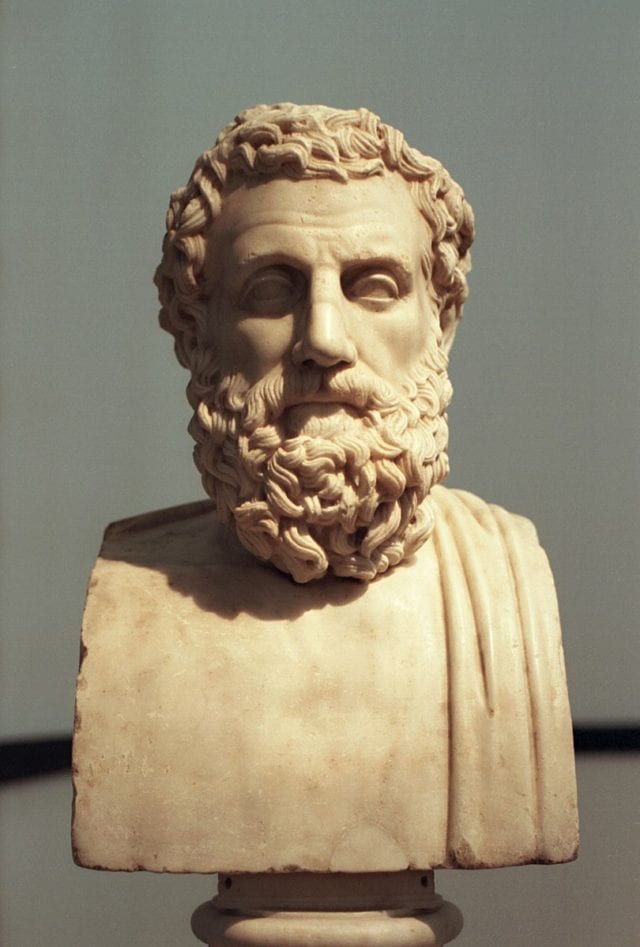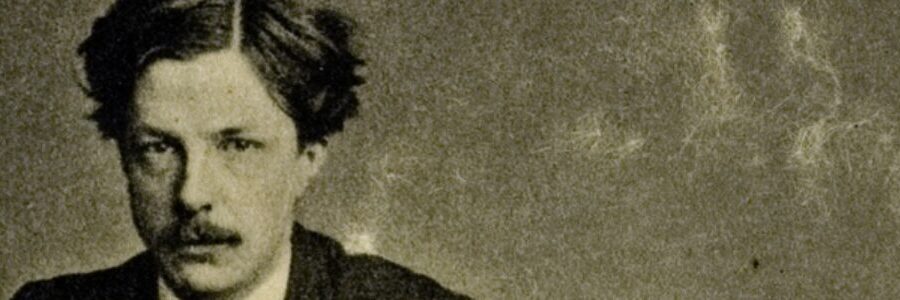Often dubbed the “Father of Tragedy”, Aeschylus wrote some of the most well-known Greek plays that survive from the ancient world, including the Oresteia and the Persians. Over the course of his life from 523 BCE to 456 BCE, Aeschylus wrote numerous plays about a variety of subjects and changed the way that theater was performed in ancient Greece, such as increasing the number of actors in a play as well as the way they interacted with each other.[1]

Therefore, it is no surprise that the renowned playwright is featured heavily in the works and letters of John Addington Symonds. Like many who study the Classics, Symonds read many of Aeschylus’ plays and they greatly influenced the way he approached the topic of same-sex relationships both in the ancient world as well as 19th century London. Aeschylus and his plays are mentioned in Symonds’ letters, A Problem in Greek Ethics (1883), as well as his Memoirs (1889-91).
In his letters, Symonds primarily mentions Aeschylus not in relation to his views on homosexuality but with reference to the difficulty of his Greek. In some of his earlier letters dating to 1860-65, Symonds wrote extensively to his sister Charlotte about the complex and sometimes tedious nature of translating ancient texts. In one letter to Charlotte written in 1860, Symonds writes at the end, “I must end now: for one of the most corrupt choruses in the “Choëphorae” of Aeschylus is awaiting my attention” (Letters I:125).[2] The date of this letter makes John Addington Symonds twenty years old and, as I am only one year older than he was at the time that this letter was written and a Classicist myself, I can more than relate to this feeling of being bogged down by challenging passages of Greek. In his later letters that date to the very end of his life, Symonds continues to mention Aeschylus to his friends and family but rather than griping about the difficult nature of the tragedian’s Greek, he quotes short passages from some of Aeschylus’ works, such as the Agamemnon and the Persians, that relate to whatever topic he is writing about and show off his rounded education as a connoisseur of the Classics.
For similar reasons as in his letters, Symonds also makes reference to Aeschylus in his Memoirs, which were written from 1889-91. The Memoirs provide a detailed account of Symonds’ life and include all of the details about Symonds’ love of the Classics as well as his sexual awakening, as it were. In this text, Symonds mentions Aeschylus only a handful of times and most notably (and charmingly) with reference to his father and grandfather. Symonds writes, “These three generations of men—my grandfather, my father and myself—correspond to the succession of Aeschylus, Sophocles and Euripides, to the transition from early pointed Gothic through Decorated to Flamboyant architecture. Medio, tutissimus ibis. ‘You will go most safely by the middle course.’ The middle term of such a series is always superior to the first and vastly superior to the third. How immeasurably superior my father was to me, as a man, as a character, as a social being, as a mind, I feel, but I cannot express”.[3] As I wrote in my introduction, Aeschylus is often considered the “Father of Tragedy” and one of the three great Greek tragedians, along with Sophocles and Euripides. The works of Sophocles and Euripides would not be what they are without Aeschylus and it is hard to consider one author without the other two. This is sweet sentiment that, in my mind, links the two triads throughout history.
Symonds also mentions Aeschylus in A Problem in Greek Ethics, written in 1883, but references him in a way that differs from his more personal texts like his letters and the Memoirs. In this book, Symonds writes about a kind of “Greek love” that existed in the ancient world and what ancient authors had to say on the subject of same-sex relationships. In the second section of this book, Symonds includes Aeschylus, Pindar, and Sophocles among the poets of “an age when paiderastia was prevalent, (and they) spoke unreservedly upon the subject”.[4] Paiderastia is the Greek word that literally means “love of boys” and refers to a sexual relationship between a man and a younger boy, usually in his teens. Paiderastia was very common in the ancient world and is the subject of many of Symonds’ works. As a homosexual man himself and someone who was witness to a relationship of this sort while attending boarding school in his youth, Symonds writes extensively on paiderastia in A Problem in Greek Ethics. Symonds argues that this was characteristic of ancient Greece and Aeschylus was only one of many authors who “spoke unreservedly on the subject”.
Symonds
references Aeschylus’ lost play the Myrmidones
as a popular example of a play that included examples of paiderastia.
Numerous playwrights included the story of Achilles and Patroclus and the
possible sexual nature of their relationship in their plays and the Mymidones is one example of such. While this
play has been lost, its subject matter nevertheless has survived. This play
deals with the same subject matter as is presented in Iliad 9-18 but Aeschylus has changed the nature of the relationship
between the two men from Homer’s Illiad,
making Patroclus older than Achilles but making Achilles the dominant lover.
This was criticized by Plato due to the diversion from the original legend but,
according to Symonds, “sufficiently establishes the fact that paiderastia was
publicly received with approbation on the tragic stage”.[5]
Symonds conjectures that Aeschylus may have written his play based off of a
non-Homeric source, which would account for the change in the relationship
between the characters, but does not change the fact that paiderastia was
prevalent and accepted in ancient Greece. Regardless, it is a fascinating comparison
to draw that reveals much about Symonds’ own opinion on the subject and on the
work of Aeschylus in general, especially with regard to Symonds’ personal relationship
to the author and the subject matter about which he writes.
[1] Daniel J. Campbell, “Aeschylus and Aristotle’s Theory of
Tragedy” (1946). Master’s Theses.
88.
https://ecommons.luc.edu/luc_theses/88.
[2] John Addington Symonds, Herbert M. Schueller, and Robert L. Peters, The Letters of John Addington Symonds, vol. 1, 3 vols. (Detroit, MI: Detroit, Wayne State University Press, 1969), 223.
[3] John Addington Symonds and Amber K. Regis, The Memoirs of John Addington Symonds: a Critical Edition (London: Palgrave Macmillan, 2016), 86.
[4] Sean Brady and John Addington Symonds, “A Problem in Greek Ethics,” essay, in John Addington Symonds (1840-1893) and Homosexuality: a Critical Edition of Sources (Palgrave Macmillan, 2012), pp. 44.
[5] ibid, 71-2.

